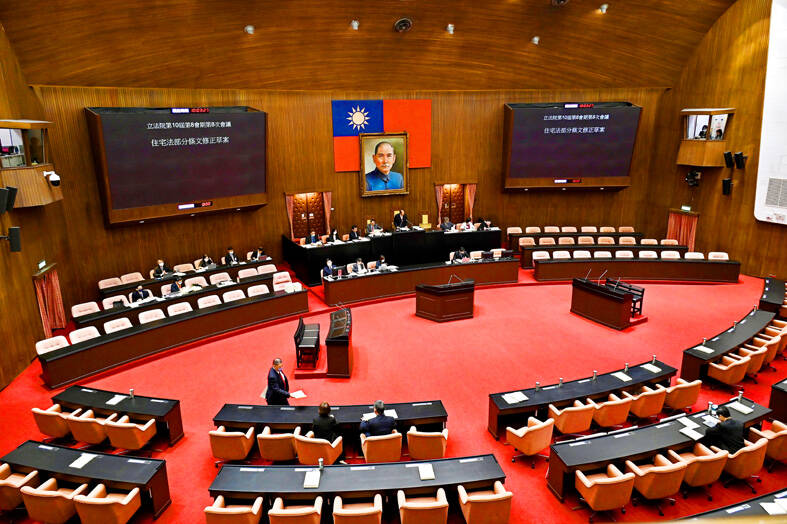The Legislative Yuan yesterday passed a bill allowing courts to issue restraining orders to prevent people from disseminating explicit images of a person without their consent, with provisions aimed at individuals and online service providers.
The bill, which amends the Domestic Violence Prevention Act (家庭暴力防治法), would allow courts to issue civil protection orders prohibiting the remaking, dissemination, broadcast, delivery or publication of intimate images of a protected individual.
Perpetrators would also be required to return any images to victims, and law enforcement officials can order them to delete the content if necessary.

Photo: Tu Chien-jung, Taipei Times
Online service providers would be required to remove or restrict access to intimate images on their Web sites when they discover such content, or when they are informed about its existence by government agencies or law enforcement.
Any content to be deleted would have to be kept by service providers for 180 days while law enforcement officials investigate the incident.
If service providers contravene the law, they could be fined up to NT$600,000, the bill says.
The legislation would also require restraining orders — which normally have a two-year limit — to remain in effect until a court metes our a final ruling if they expire while efforts are being made to change or extend them.
Under current law, restraining orders are allowed to expire while a change or extension is being considered, leaving the person who asked for protection vulnerable.
The proposed amendments would also grant police permission to arrest abusive partners who do not live with the victim, as well as expand the scope of protective orders.
Under the amendment, if a current or former intimate partner physically harms or mentally abuses a victim, police would be allowed to arrest the perpetrator, even if they do not live together.
Regarding protective orders, the amendment expands their scope to prohibit abusers and their close family members from accessing information about a victim or their underage children.
The amendments would also allow for those who were abused by family members when they were minors to change their household registration and prohibit their immediate relatives from accessing their personal information, as long as certain criteria are met.
The amendments also provide same-sex partners the same protections by changing the definition of “in-laws” to refer to the relatives of each partner within four degrees of biological relation.

Tropical Storm Gaemi strengthened into a typhoon at 2pm yesterday, and could make landfall in Yilan County tomorrow, the Central Weather Administration (CWA) said yesterday. The agency was scheduled to issue a sea warning at 11:30pm yesterday, and could issue a land warning later today. Gaemi was moving north-northwest at 4kph, carrying maximum sustained winds near its center of up to 118.8kph and gusts of 154.8kph. The circumference is forecast to reach eastern Taiwan tomorrow morning, with the center making landfall in Yilan County later that night before departing from the north coast, CWA weather forecaster Kuan Shin-ping (官欣平) said yesterday. Uncertainty remains and

SEA WARNING LIKELY: The storm, named Gaemi, could become a moderate typhoon on Wednesday or Thursday, with the Taipei City Government preparing for flooding A tropical depression east of the Philippines developed into a tropical storm named Gaemi at 2pm yesterday, and was moving toward eastern Taiwan, the Central Weather Administration (CWA) said. Gaemi could begin to affect Taiwan proper on Tuesday, lasting until Friday, and could develop into a moderate typhoon on Wednesday or Thursday, it said. A sea warning for Gaemi could be issued as early as Tuesday morning, it added. Gaemi, the third tropical storm in the Pacific Ocean this typhoon season, is projected to begin moving northwest today, and be closest to Taiwan on Wednesday or Thursday, the agency said. Today, there would likely

DISRUPTIONS: The high-speed rail is to operate as normal, while several airlines either canceled flights or announced early departures or late arrivals Schools and offices in 15 cities and counties are to be closed today due to Typhoon Gaemi, local governments announced last night. The 15 are: Taipei, New Taipei City, Taoyuan, Tainan, Keelung, Hsinchu and Kaohsiung, as well as Yilan, Hualien, Hsinchu, Miaoli, Chiayi, Pingtung, Penghu and Lienchiang counties. People should brace for torrential rainfall brought by the storm, with its center forecast to make landfall on the east coast between tonight and tomorrow morning, the Central Weather Administration (CWA) said. The agency issued a sea warning for the typhoon at 11:30pm on Monday, followed by a land warning at 11:30am yesterday. As of

CASUALTY: A 70-year-old woman was killed by a falling tree in Kaohsiung as the premier warned all government agencies to remain on high alert for the next 24 hours Schools and offices nationwide are to be closed for a second day today as Typhoon Gaemi crosses over the nation, bringing torrential rain and whipping winds. Gaemi was forecast to make landfall late last night. From Tuesday night, its outer band brought substantial rainfall and strong winds to the nation. As of 6:15pm last night, the typhoon’s center was 20km southeast of Hualien County, Central Weather Administration (CWA) data showed. It was moving at 19kph and had a radius of 250km. As of 3pm yesterday, one woman had died, while 58 people were injured, the Central Emergency Operation Center said. The 70-year-old